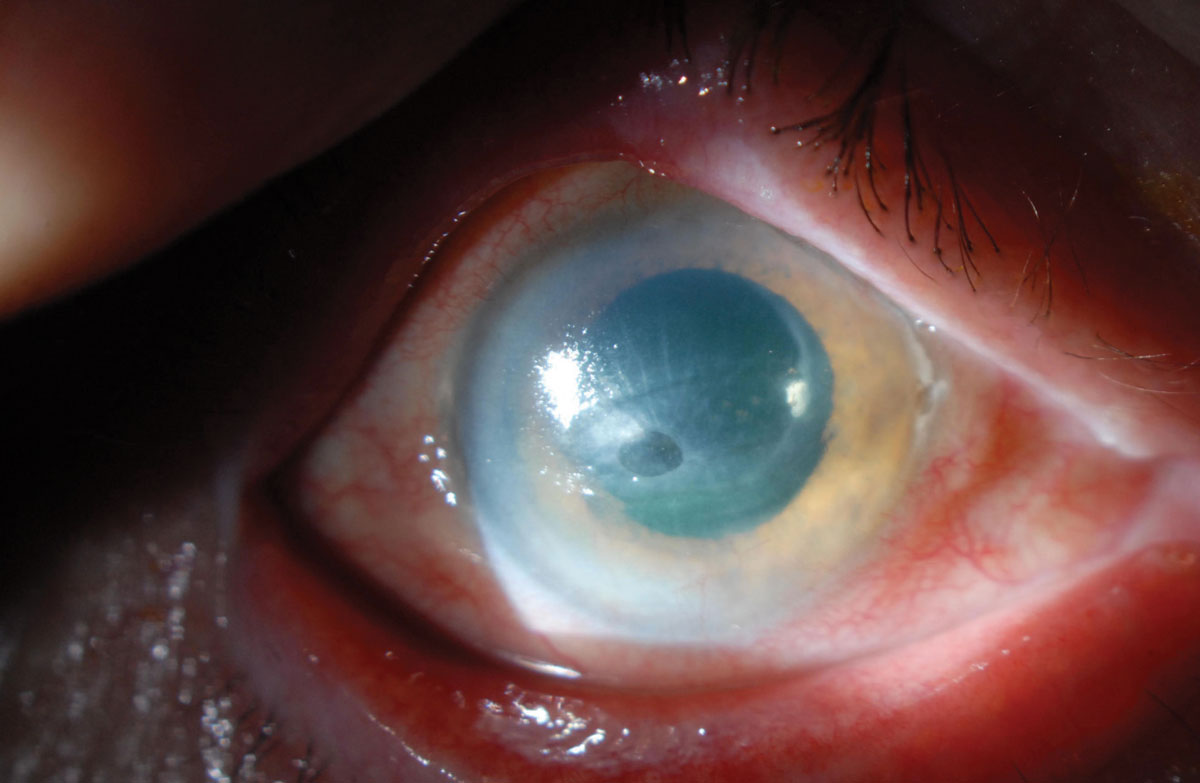 |
| Over time, corneal melting may occur due to NK. Photo: Zeba A. Syed, MD. Click image to enlarge. |
Neurotrophic keratopathy (NK) is a relatively uncommon, underdiagnosed degenerative corneal disease that is caused by damage to the ophthalmic branch of the trigeminal nerve. Over time, epithelial breakdown, corneal ulceration, corneal melting (thinning), perforation and loss of vision may occur. The best opportunity to reverse ocular surface damage is in the earliest stage of the disease. However, patients typically experience few symptoms, and diagnosis is often delayed. A recent study set out to raise awareness of the causes of NK and provide screening and treatment guidelines.
An 11-member expert panel used a validated methodology to develop consensus on how to best go about managing NK. The clinicians reviewed literature on the diagnosis and management of NK and then rated a detailed set of 735 scenarios. In 646 scenarios the panelists rated whether a test of corneal sensitivity was warranted, in 20 scenarios they considered the adequacy of specific tests and examinations to diagnose and stage NK and in 69 scenarios they rated the effectiveness of certain treatments for NK. Their ratings were used to develop clinical recommendations.
There was agreement on 94% of scenarios. The panelists strongly recommended corneal sensitivity testing under the following circumstances:
- Persistent epithelial defect that does not improve within 14 days.
- Painless, newly observed epithelial defect of unknown etiology.
- History of herpetic eye disease.
- History of procedures that might have damaged the trigeminal nerve or involved the trigeminal nerve.
- Pain in the affected eye and multiple, concurrent risk factors such as persistent, poorly controlled diabetes and either reduced blink or a history of corneal procedures.
As far as treatment suggestions went, the team agreed multiple treatments should be used concurrently, especially in more advanced disease. They noted that optimal care requires identifying and treating the underlying causes of NK, in addition to the disease itself. The panel also was in agreement that patients with NK should be evaluated for ocular side effects of systemic therapies.
For all stages of NK, the panelists noted that optimal care included decreasing or discontinuing altogether preservative-containing topical medications to the extent possible. They concluded that regardless of NK stage, optimal treatments (alone or in combination, depending on the circumstances) may include: preservative-free tear substitution or lubricants, punctal occlusion and autologous serum tears/umbilical cord serum drops/platelet rich plasma drops.
“We believe this guidance could improve the quality of care for NK patients by helping to diagnose patients earlier in their disease course when progression can be reduced or stopped and by recommending evidence-based treatments for each disease stage,” the study authors concluded. However, they noted these expert recommendations should be validated with clinical data.
Dana R, Farid M, Gupta PK, et al. Expert consensus on the identification, diagnosis, and treatment of neurotrophic keratopathy. BMC Ophthalmol. September 8, 2021. [Epub ahead of print]. |


